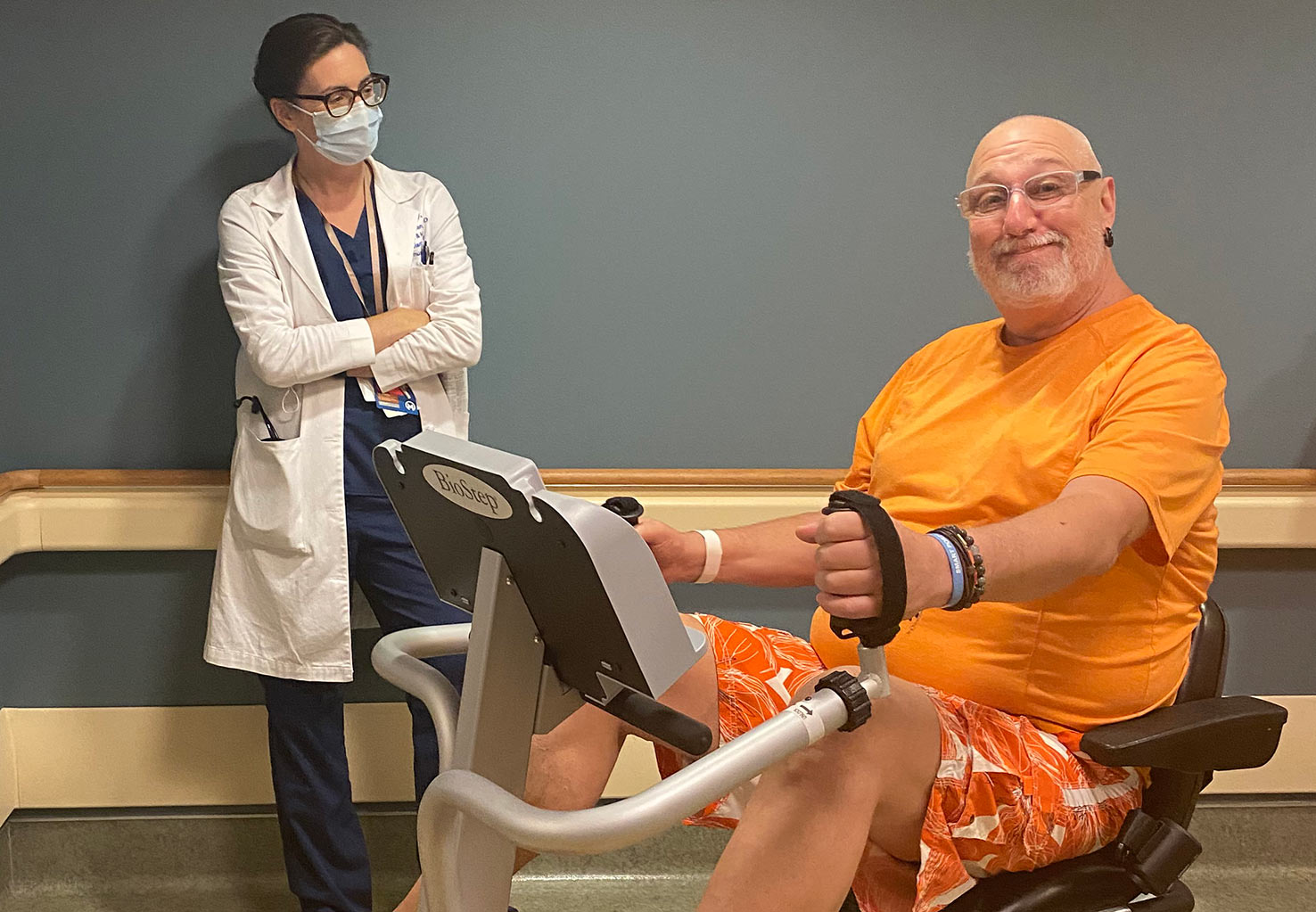
A Holistic Approach to Treating Hematologic Malignancies: Combining Complex Cell Therapies and Exercise for Optimal Outcomes
Here at Moffitt, we are constantly striving to provide the best care for our patients, especially those undergoing complex cellular therapy in a tertiary referral center. While our primary focus lies in the advancements of medical treatments, it is crucial that we acknowledge the immense benefits of incorporating exercise into the holistic care of our patients.
Exercise has long been recognized as a vital component of a healthy lifestyle, but its role in the treatment of cancer patients has often been overlooked. However, recent research has shed light on the profound impact exercise can have on patients' physical and psychological well-being, particularly during their cellular therapy journey.
The department of BMT and Cellular Immunotherapy is excited to introduce an innovative exercise program tailored specifically for patients undergoing complex cellular therapy. This program aims to harness the potential of exercise as an adjuvant therapy to complement medical interventions, ultimately enhancing the overall treatment outcomes and quality of life for our patients.
Why Exercise Matters:
- Improved Physical Function: Engaging in regular exercise has shown to enhance cardiovascular fitness, muscular strength, and endurance, enabling patients to better cope with the physical demands of cellular therapy. By increasing physical function, patients may experience reduced treatment-related side effects, faster recovery, and improved overall functional capacity.
- Enhanced Immune Response: Exercise has been found to modulate immune function, leading to improved immune response against cancer cells. Studies suggest that exercise can stimulate immune surveillance, potentially enhancing the effectiveness of cellular therapies such as immunotherapies or adoptive T-cell therapies.
- Mitigation of Treatment-Related Side Effects: Many cancer treatments are associated with distressing side effects, such as fatigue, muscle wasting, and decreased bone density. Regular exercise has proven to mitigate these side effects by reducing fatigue, preserving muscle mass, improving bone health, and positively impacting treatment tolerance and adherence.
- Psychological Well-being: Cancer diagnosis and treatment can take a toll on patients' mental health, leading to anxiety, depression, and decreased overall quality of life. Exercise has been shown to alleviate these psychological burdens by promoting the release of endorphins, reducing stress, improving sleep patterns, and boosting patients' sense of well-being and self-esteem. Exercise helps empower patients by giving them a strategy that is within their control and can help improve their trajectory through treatments that can be challenging and overwhelming.
Introducing Our Exercise Program:
Our center's newly established exercise program is designed by a team of oncologists, physiotherapists, and exercise specialists who understand the unique needs and challenges faced by patients undergoing complex cellular therapy. The program is tailored to each patient's individual capabilities, taking into consideration their medical condition, treatment schedule, and overall fitness level.
Key features of our exercise program include:
Personalized Assessment: Every admitted patient undergoes a comprehensive evaluation to determine their baseline fitness level and identify any specific areas of concern or limitation. Our experienced physical therapy team then works on a plan tailored to their needs that changes throughout the treatment process.
Resources: Patients will receive educational materials and resources to help them understand the importance of exercise, learn proper techniques, and gain motivation to continue their physical activity journey beyond their cellular therapy.
Combining Complex Cell Therapies and Exercise
By integrating exercise into the treatment process of hematologic malignancies, healthcare providers can create a holistic approach that may enhance the benefits of complex cell therapies. Here's how:
Pre-Treatment Conditioning
Exercise can be used as part of pre-treatment conditioning to improve patients' physical fitness before undergoing complex cell therapies. Engaging in low-impact aerobic exercises on a stationary bike or semi-recumbent elliptical machine can help patients build endurance, strengthen muscles, and improve cardiovascular health. This preparation can better equip patients to withstand the physical demands of treatment and potentially reduce recovery time. In addition, Moffitt’s MPROVE Lab is already conducting exercise “prehabilitation” research to improve fitness prior to CAR T, and now these patients will also be able to continue exercising in the BMT CI Unit during and after the therapies.
During Treatment
Complex cell therapies often require patients to stay in a hospital or clinic for prolonged periods from two weeks to over a month. Incorporating exercise machines into these environments allows patients to remain physically active during treatment. Not only does exercise help maintain physical function and psychological well-being, but it may also enhance the efficacy of complex cell therapies by optimizing immune function and circulation.
Moffitt is now one of the first centers offering Blood and Marrow Transplant and Cellular Immunotherapy (BMT-CI) patients the opportunity to participate in an exercise program as part of their treatment plan alongside complex cell therapies.
Four semi-recumbant elliptical machines or full-seat bikes, have been delivered to Moffitt’s campus, and the program launch is imminent - sometime in June or July. Moffitt’s initial goal with the program is to see 10-15 patients using the bikes and maintaining consistent diaries over the next few months as part of a Performance Improvement project with future goals of a research study comparing inflammatory markers and neurotoxicity in patients who did use the bikes vs. those who didn’t.

The idea of such a program took hold when Ron Jennings, Director of Rehabilitative Services, reached out to Miki Williams, the Director of Nursing, to let her know that the platelet threshold for patients to be approved for exercise had recently changed and could open up an opportunity to provide a form of exercise to the otherwise sedentary patients within the transplant units.
It has been an interdisciplinary effort to get the machines and programs coordinated, including efforts from Nursing, Physical Therapy, Infection Control, Risk Management & Quality, and Research departments.
While Moffitt already encourages early mobility after transplants with walks around the unit, now we can offer enhanced exercise options. Patients who will benefit the most include those who have previously requested to bring in their own bikes or equipment to the units but cannot due to infection risk. By providing these elliptical machines to the inpatient transplant units, we can finally bring the gym to these patients.
Patients can use the machines anytime and are encouraged to use them for 5-, 10-, or 15-minute sessions four times daily and complete provided diaries documenting the exercise. Physical therapists will guide patients individually on which modes are most appropriate for them to use.
Post-Treatment Rehabilitation
After completing complex cell therapies, patients enter a recovery and rehabilitation phase. Exercise machines can play a crucial role in this process by supporting patients in rebuilding strength, endurance, and overall fitness. Regular exercise helps reduce post-treatment fatigue, improve cardiovascular health, and promote psychological well-being, enabling patients to regain a sense of normalcy and enhance their quality of life.
We believe that integrating exercise as a core component of patient care in complex cellular therapy will have far-reaching benefits. By adopting a comprehensive approach that encompasses both medical and lifestyle interventions, we can empower our patients to take an active role in their treatment, fostering resilience, and improving their long-term outcomes.
We invite you to refer your patients to our exercise program and join us in redefining cancer care. Together, we can provide the highest level of comprehensive care, leading the way toward a brighter future for our patients.
By referring patients to Moffitt, you can give them the opportunity to participate in innovative initiatives such as our new exercise programs. It’s simple and easy to do, with online referrals typically responded to in 24-48 hours. After referral, we work closely with referring physicians to keep you up to date on patient progress. Together, we can embrace the power of holistic care to transform the cancer treatment landscape and provide hope for those battling hematologic malignancies.
If you’d like to refer a patient to Moffitt, complete our online form or contact a physician liaison for assistance.
